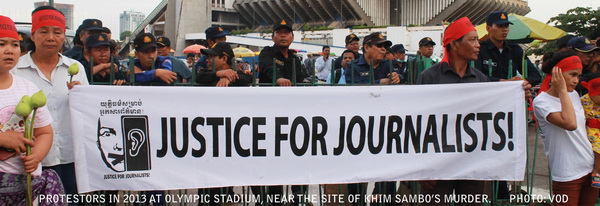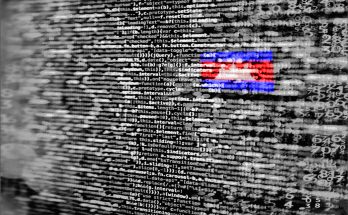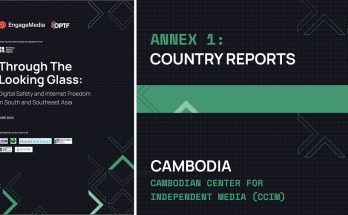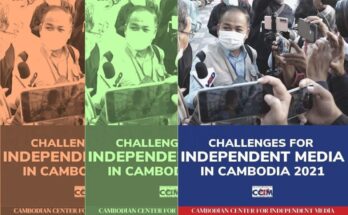
Out of the 13 journalists killed in Cambodia from 1993 until 2014, only two of the cases have resulted in the accused being sentenced and serving jail terms. In four of the murder cases, although suspects were arrested, they were later released and in eight of the cases nobody has been charged or any arrests made.
Before these murders happened, six of the 13 journalists were writing about corruption within the Cambodian government. Three others were writing about illegal logging in Cambodia, one was covering an event being held by the Khmer National Party and another journalist was killed for working in a radio station that refused to broadcast a political speech. Of the murdered journalists, one had taken photographs of soldiers looting in a public market while another had exposed illegal fishing.
According to CCIM’s 2014 report, 17 percent of Cambodian journalists have been mentally harmed and 28 percent have been threatened.
Let’s consider Hang Serei Oudom’s case, a journalist for Vorakchun Khmer Newspaper who was based in Ratanakiri province. He was murdered in September 2012. Before the murder, he had reported about several illegal logging cases in the Northeastern Province.
Im Chanthy, wife of the late Hang Serei Oudom, recalls the events leading up to her husband’s death. She says that her husband had close ties with An Bunheng alia Eng, a member of the military police in Ratanakiri: “On that day, he disappeared in the daytime. At 11am he came back home and told me that he would not be returning home for dinner. Eng had called him to asked to have a meal together. That was in the morning. At 5PM he came back home to take a bath, went out again and disappeared until 9PM. I thought…I just know that when he came back for a bath at 5PM, he told me: Today, I may not return for dinner because brother Eng call me to meet him. I’m going now to meet brother Eng.”
Two days after he disappeared, the body of Hang Serei Oudom was found on a cashew farm. Several suspects were summoned by the Provincial court including An Bunheng alia Eng and his wife. The court detained the couple, but released them almost a year later saying that the case could not be pursued due to a lack of evidence.
Im Chanthy says she is not happy that the court has dropped the case. “They went to collect evidence. They saw blood, stick and everything. We saw them (suspects) relocating from the scene; they stopped living there. The truth is in front of our eyes,” says Im Chanthy.
Chhay Thy, Adhoc’s human rights facilitator based in Ratanakiri confirmed that there was irregularity in this case.
“In the end, Ratanakiri provincial court dropped the case entirely. It is unjust because the provincial court prosecutor and police made their efforts on the case,” said Chhay Thy.
Both Chea Sopheak, prosecutor at Ratanakiri Provincial Court who was in charge of the case, and Chhay Thy of Adhoc say an appeal was lodged for the murder case of journalist Hang Serei Oudom in late 2013. Almost two years later, there has been no further hearing on the case.
VOD tried to contact Ouk Savuth, the Appeals Court General Prosecutor to get an update on the case, but has received no response.

Im Chanthy, says the murder case of her husband has been ignored since the outset, when it first happened in Ratanakiri and again when it got to the Appeals court and thinks that there are irregularities in this case.
“The case, if dealt with fairly,will deliver us justice. But they have strong support and have ignored this case. They have ignored it since the beginning. I am poor; my father is a farmer, I almost cannot get enough to eat for the day,”said Im Chanthy. She adds “I went to (the Appeals Court) once or twice. I only heard rumors that because we are ordinary people, even though the case is huge, but as our capability is small, they deal with it according to what we have. I am a construction worker, we don’t even have money to travel to the court. Sometimes, we did not contact the court. Then they closed it. So, it disappeared,” says Chanthy.
Im Chanthy is appealing to all relevant authorities to help find justice for her late husband. “All Ministries, NGOs, please help find justice for us, so that we feel good. My child, my husband, and I will be satisfied. I think the authorities should deal with it transparently. They should know what is right and what is wrong and state the truth. That would satisfy me. But in this case, they have not found what is wrong and what is right.”
Sok Sam Oeun is a lawyer. He is concerned that there is a lack of will by the government to conduct any investigation into these cases. Sok Sam has provided training on the Press Law and other relevant laws to Cambodian journalists. He told VOD that the legal system in Cambodia is problematic because it requires judges to do the investigations and this carries it with many risks of not being fair and impartial.
Cambodia passed its Press law in 1995 and provided the framework for journalists to have the freedom to report according the 1st Article along with others. This is echoed in Article 41 of the Cambodian Constitutional Law.
Cambodia was ranked 139 out of 180 countries for freedom of expression by Reporters Without Borders in 2014, which puts it in the category of “Not Free”.

Pen Bona, President of the Club of Cambodia Journalists (CCJ), says the journalism sector in Cambodia has improved compared to the situation in 1993, but the sector still has a long way to go.
“We still have many problems and all journalists need to collaborate and advocate for our freedom, to make it comprehensive democratically; and for the authorities and the public to give more regard and acknowledge that the media is the real fourth estate,” said Bona.
He added that impunity for crimes is the most challenging issue facing Cambodian journalists.
Journalists have been murdered and even now the perpetrators remain at large. Impunity is very common and it is a huge problem which creates fear and is an impediment to the ability of journalists to do their work,” said Bona.
Am Sam Ath, LICADHO Technical Coordinator says that impunity seriously inhibits freedom and civil rights for access to information. He added that if impunity continues in Cambodia, professional journalists will be deterred from reporting social problems. Impunity still exists because of a lack of will by politicians and some of the unresolved cases of murdered journalists are linked to politicians.
“The court is capable of investigating those cases. But there is a lack of political will by politicians and the courts,” said Sam Ath.
Chak Sopheap is the executive director of the Cambodian Center for Human Rights (CCHR). She says, “Without a doubt, the murders and impunity negatively impact freedom of expression, not only because they are silencing critical voices, but because it sends a clear threat to others who dare to stand up against governmental and private wrong doing. ” Sophea adds “the odious relationship between Cambodia’s business tycoons, the military and the government creates an environment whereby those who dare to challenge corrupt practices are put at significant risk. This in turn, can create a culture of self-censorship.”
Pen Bona calls for law enforcement to resolve the conflicts happening in the practice of journalism and the ability of journalists to perform their tasks with professionalism.

“When journalists make professional mistakes, the law should be enforced through the due processes. We the CCJ don’t favour journalists who commit any wrongdoing. We appeal to all journalists to abide by the Codes of Ethics and the relevant laws. However, when a mistake happens due to journalistic practice, the authorities should deal with the case by enforcing the law, not by killing, hurting, and threatening,” says Pen Bona.
Pa Nguon Teang, Cambodian Center for Independent Media (CCIM) Executive Director, says journalists have contributed to making Cambodia democratic. But he doubts whether the Cambodian government has the willingness to support civil participation in the process of democracy. He adds that if impunity for crimes against journalists continues, it encourages the perpetrators to commit other crimes and threatens the spirit and rights of the people to take part in building a democracy.
The government and the courts can work together, given the commitment and the will, if they want to end impunity for crimes carried out against journalists.
Ouk Kimseng, Deputy Secretary of State at the Ministry of Information says that all the relevant institutions should try to get perpetrators arrested and bring them to court in order to end impunity. Moreover, he encourages journalists to question relevant institutions on impunity against journalists.
Lay Samean is a VOD reporter. He was attacked by Khan Donpenh’s security forces and beaten until he was unconscious on World Press Freedom Day, 3 May 2014. He said that the issue of security for Cambodian journalists remains complicated.
“I don’t feel safe when I am out covering news. I feel afraid that someone will threaten me. I am only carrying out my professional responsibilities, I don’t carry weapons and so should not feel threatened. The authorities need to act quickly to end the impunity for the perpetrators of crimes against journalists. For example, in my case, we provided clear evidence, photos as well as videos and yet I have been waiting for justice to be served. The authorities need to arrest the perpetrators, charge them and take them to court,” says Samean.

A short educational video “When” was produced by Cambodian media students. The video was released on Facebook in 2015. It depicts the story of Kuch Vannyda.
Kuch Vannyda is a journalist who wrote many stories about illegal logging for the Phnom Penh Post. She was offered bribes such as a luxury car and a modern villa on the outskirts of the city to stop covering this issue but she rejected all the offers. Vannyda was seriously injured by two men believed to be employed by the perpetrator. Vannyda accepted ASEAN’s Best Journalist Award in 2015. However, her case has been dismissed by the courts due to a lack of evidence. A video thesis was produced by Chhit Kanika as part of her bachelor degree at the Media University. Kanika told VOD that the story of Kuch Vannyda was produced to increase public awareness about impunity against journalists.
The Deputy Chief of Staff at the Post Khmer, Chhay Channyda lives in fear working as a professional journalist.
It is difficult to say that we are safe. In reality, even the member of parliamentarians still be polled out of their cars and kicked nearby the national assembly. So, we are only journalist without immunity, we may be attacked too. We still be threaten.”
Channyda urges the government to take quick action to end impunity and strengthen the implementation of existing laws to provide real protection and freedom to journalists to be able to safely do their work. .
“Impunity will continue to ravage Cambodia until we have a clear separation of powers and an independent judiciary. On an individual level, it is vital that critical voices continue to speak out against corruption and human rights abuses. Moreover, it is vital that critical voices are supported by civil society and the general public. To bring about fundamental change, people power holds the key,” says Chak Sopheap.



